高中英语倒装句最完整简洁版
- 格式:ppt
- 大小:853.50 KB
- 文档页数:37
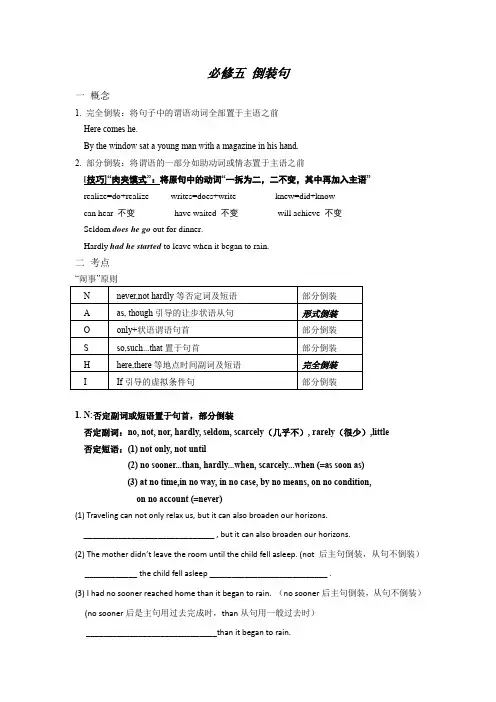
必修五倒装句一概念1. 完全倒装:将句子中的谓语动词全部置于主语之前Here comes he.By the window sat a young man with a magazine in his hand.2. 部分倒装:将谓语的一部分如助动词或情态置于主语之前[技巧]“肉夹馍式”:将原句中的动词“一拆为二,二不变,其中再加入主语”realize=do+realize writes=does+write knew=did+knowcan hear 不变have waited 不变will achieve 不变Seldom does he go out for dinner.Hardly had he started to leave when it began to rain.二考点1. N:否定副词或短语置于句首,部分倒装否定副词:no, not, nor, hardly, seldom, scarcely(几乎不), rarely(很少),little否定短语:(1) not only, not until(2) no sooner...than, hardly...when, scarcely...when (=as soon as)(3) at no time,in no way, in no case, by no means, on no condition,on no account (=never)(1) Traveling can not only relax us, but it can also broaden our horizons.______________________________ , but it can also broaden our horizons.(2) The mother didn’t leave the room until the child fell asleep. (not 后主句倒装,从句不倒装)____________ the child fell asleep ___________________________ .(3) I had no sooner reached home than it began to rain. (no sooner后主句倒装,从句不倒装)(no sooner后是主句用过去完成时,than从句用一般过去时)______________________________than it began to rain.2. A:形式倒装(前置)as, thought 引导的让步状语从句,只把强调的内容提到句首,主谓结构并不倒装Though/As he was tired, he still went on with his work.Tired though/as he was, he still went on with his work.Though/As he is a child, he knows a lot.Child though/as he is, he knows a lot. (如果要提前的是单数可数名词,其前不加冠词)3. O: “only+状语“置于句首,主句部分倒装We can learn English well only in this way._______ in this way ______________________.We find out the truth only when he returned._______ when he returned _______________________ .注意:(1) only+主语,不倒装Only you can help me.(2) only+状语从句,从句不倒装,主句倒装Only after being asked three times did he come to the meeting.4. S: so/such...that置于句首加强语气,so/such所在句部分倒装He was so angry that he couldn’t speak.So angry ____________ that he couldn’t speak.He is such a good boy that we all love him.Such a good boy __________ that we all love him.5. H: 表方位或时间的的副词和介词短语置于句首,完全倒装方位副词:here, there, up, down, in, away, off, out, back时间副词:now, then介词短语:in the room, on the wall, in front of, by the river 等The bus comes here._______________________.Your turn comes now.________________________.The tree stood in front of the house._______________________________.注意:(1) 主语只能是名词,代词不倒装Here it comes.(2) 谓语必须是简单时态,如一般现在,一般过去The bus is coming here.= Here comes the bus.6. I : if引导的虚拟条件句的省略形式,去掉if,从句变成部分倒装If I were you, I would not let her go.________________ , I would not let her go.If they had helped us, we would not have failed.___________________ , we would not have failed.7. 补充:So do I. 我也是 Neither do I. 我也不So/Neither +be/助动词/情态动词+主语-I’ve got a lot of work to do.-______________.(我也是)-Linda can’t answer the question.-______________.(Peter也答不上来)。

(完整版)高中英语语法倒装句讲解及练习(附答案)高中英语倒装句倒装句分为全部倒装和部分倒装1全部倒装全部倒装是只将句子中的谓语动词全部置于主语之前。
此结构通常只用于一般现在时和一般过去时。
常见的结构有:1)here, there, now, then, thus等副词置于句首, 谓语动词常用be, come, go, lie, run等表示来去或状态的动词。
例如:Then came the chairman. 那时总裁来了。
Here is your letter. 你的信。
2). up,down,out,away,in , off, ahead放于句首Up jumped the cat and caught the mouse.Ahead sat an old woman.3)表示地点,时间,方向等的介词短语放在句首时例如:After the head walked a group of workers.4.“作表语的现在分词/过去分词/形容词+系动词+主语”形式的完全倒装Seated in the front were the guests.注意:上述全部倒装的句型结构的主语必须是名词,如果主语是人称代词则不能完全倒装。
例如:Here he comes. 他来了。
Away they went. 他们走开了。
2部分倒装部分倒装是指将谓语的一部分如助动词或情态倒装至主语之前。
如果句子的谓语没有助动词或情态动词,则需添加助动词do, does或did,并将其置于主语之前。
1. 句首为否定或半否定的词语,如no, not, never, seldom, little, hardly, rarely, scarely, in no way, under no circumstance, at no time决不, not until…等。
例如:Never have I seen such a performance. 从未见过如此糟糕的表演。
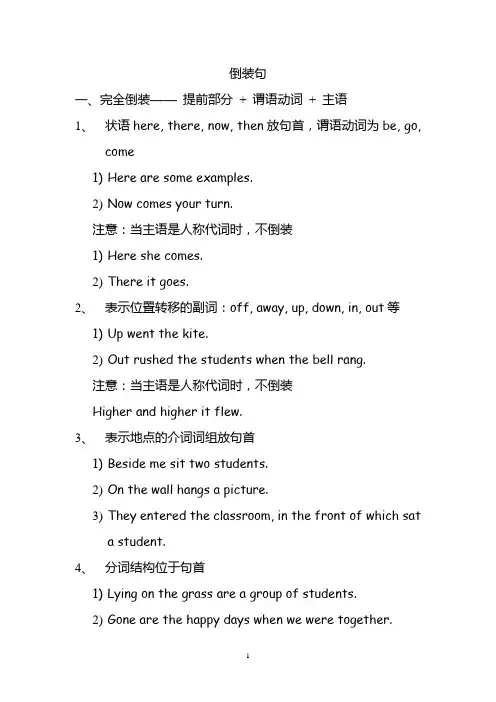
倒装句一、完全倒装——提前部分+ 谓语动词+ 主语1、状语here, there, now, then放句首,谓语动词为be, go,come1)Here are some examples.2)Now comes your turn.注意:当主语是人称代词时,不倒装1)Here she comes.2)There it goes.2、表示位置转移的副词:off, away, up, down, in, out等1)Up went the kite.2)Out rushed the students when the bell rang.注意:当主语是人称代词时,不倒装Higher and higher it flew.3、表示地点的介词词组放句首1)Beside me sit two students.2)On the wall hangs a picture.3)They entered the classroom, in the front of which sata student.4、分词结构位于句首1)Lying on the grass are a group of students.2)Gone are the happy days when we were together.5、表语放句首“表语+ 系动词+ 主语”1)In each class are 40 students.2)Among the audience are his parents.3)Present at the meeting was the general manager.二、部分倒装——提前部分+情态动词/助动词+主语+动词原形1、否定副词提前not, no, never, neither, few, little, seldom, rarely, hardly, scarcely, barely, not until, in vain(徒然), by no means(决不), in no time(立即,马上), under/in no circumstances(在任何情况下决不)1) In vain did I try to prevent him from smoking.2) By no means should we speak like that.3) Not until he was eight did he go to school.2、Not only…but also, No sooner…than, Hardly/scarcely/barely…when 主句部分倒装1)Not only can she type but also she can operate the computer.2) Hardly had she reached home when it started to rain.3、only + 状语放句首1) Only in my own home can I sleep well.2) Only when he came back did his mother go to bed.注意:only + 其他成分放句首,不倒装Only doctors can save him.4、so … that…的结果状语从句中,so …放句首1) So fat is she that here classmates often make fun of her.2) So clearly did he explain the text that we all understood it.5、So/Neither + 助动词/情态动词+ 主语“某人也一样”So + 主语+助动词/情态动词“某人确实如此”So it is with sb “某人也一样”用于谓语动词既有肯定又有否定,或有多种形式Mary: I caught the first bus. I am not late for school.John: So it is with me.6、虚拟条件句1)Were he here(= If he were here), he could help us.2)Should she give up smoking, his illness would be curedbefore long.7、形容词/副词/名词+ as/though + 主语+ 谓语动词=Though 引导的让步状语从句1)Young as/though she was (= Though she was young),she could speak many foreign languages.2)Girl as/though she is (= Though she is a girl), she isvery brave.3)A young boy as/though he is (= Though he is a youngboy), he can play the piano beautifully.4)Hard as they had tried, they failed.8、方式副词或频率副词放句首,如well, many a time, often,long等1)Many a time has my father given me help.2)Often do we go out for a walk after dinner.3)Long did we wait before he came back.注意:thus放句首,完全倒装Thus ended the meeting.9、表示祝愿May you succeed! (部分倒装)Long lives our country! (全部倒装). I finally got the job I dreamed about. Never in my life _____ so happy.(NMET2000)A. did I feelB. I feltC. I had feltD. had I felt2. Not a single song ____ at yesterday’s party.(2000年上海)A. she sangB. sand sheC. did she singD. she did sing3. _____ can you expect to get a pay rise.(2000年北京春季)A. With hard workB. Although work hardC. Only with hard workD. Now that he works hard4. Only when the war was over _____ to his hometown.(2001上海春季)A. did the young soldier returnB. the young soldier returnedC. returned the young soldierD. the young soldier did return5. –You forgot your purse when you went out.–Good heavens! _____.(2002上海)A. so did IB. so I didC. I did soD. I so did6. Not only _____ interested in football but _____ beginning to show an interest in it.(2002上海春季)A. the teacher himself is; all his students areB. the teacher himself is; are all his studentsC. is the teacher himself; are all his studentsD. is the teacher himself; all his students are7. The old couple have been married for 40 years and never once _____ with each other.(NMET2003)A. they had quarreledB. they have quarreledC. have they quarreledD. had they quarreled8. _____ snacks and drinks, but they also brought cards for entertainment when they had a picnic in the forest.(2004上海)A. Not only they broughtB. Not only did they bringC. Not only brought theyD. Not only they did bring9. I failed in the last examination last term and only then _____ the importance of studies.(2004重庆)A. I realizedB. I had realizedC. had I realizedD. did I realize10. Of the making of good books there is no end; neither _____ any end to their influence on man’s lives.(2004广东)A. there isB. there areC. is thereD. are there11. Maybe you have been to many countries, but nowhere else _____ such a beautiful palace. (2004辽宁)A. can you findB. you could findC. you can findD. could you find12. –I would never come to this restaurant again. The food is terrible.–_____.(2004广西)A. Nor am IB. Neither would IC. Same with meD. So do I13. Mary never does any reading in the evening, _____.(NMET2005)A. so does JohnB. John does tooC. John doesn’t tooD. nor does John14. Never before _____ in greater need of modern public transport than it is today. (2005上海)A. has this city beenB. this city has beenC. was this cityD. this city has15. They have a good knowledge of English but little _____ they know about German.(2005天津)A. haveB. didC. hadD. do16. –Well, I do think the rabbit is a beautiful, gentle animal which can run very fast.–_____.(2005辽宁)A. So it isB. So is itC. So does itD. So it does17. In the dark forest _____, some large enough to hold several English towns.(2005辽宁)A. stand many lakesB. lie many lakesC. many lakes lieD. many lakes stand18. Only after my friend came _____.(2005福建)A. did the computer repairB. he repaired the computerC. was the computer repairedD. the computer was repaired19. –Father, you promised!–Well, _____. But it was you who didn’t keep your word first.(2005湖北)A. so was IB. so did IC. so I wasD. so I did20. _____, he talks a lot about his favorite singers after class.(2005重庆)A. A quiet student as he may beB. Quiet student as he may beC. Be a quiet student as he mayD. Quiet as he may be a student21. –Maggie had a wonderful time at the party.–_____, and so did I.(2005安徽)A. So she hadB. So had sheC. So she didD. So did she22. _____ about wild plants that they decided to make a trip to Madagascar for further research.(2005江苏)A. So curious the couple wasB. So curious were the coupleC. How curious the couple wereD. The couple was such curious23. _____, Carolina couldn’t get the door open.(2005广东)A. Try as she mightB. As she might tryC. She might as tryD. Might she as try24. Only in this way _____ to make improvement in the operating system.(2003上海春季)A. you can hopeB. you did hopeC. can you hopeD. did you hope25. Just in front of our house _____ with a history of 1,000 years.(2006上海春季)A. does a tall tree standB. stands a tall treeC. a tall tree is standingD. a tall tree stands26. Fitness is important in sport, but of at least _____ importance are skills.(2006天津)A. fairB. reasonableC. equalD. proper27. I’ve tried very hard to improve my English. But by no means _____ with my progress.(2006重庆)A. the teacher is not satisfiedB. is the teacher not satisfiedC. the teacher is satisfiedD. is the teacher satisfied28. _____ by keeping down costs will PowerData hold its advantage over other companies.(2006浙江)A. OnlyB. JustC. StillD. Yet29. Never in my wildest dreams _____ these people are living in such poor conditions. (2006安徽)A. I could imagineB. could I imagineC. I couldn’t imagineD. couldn’t I imagine30. So difficult _____ it to work out the problem that I decided to ask Tom for advice.(2006广东)A. I did findB. did I findC. I have foundD. have I found31. _______homework did we have to do that we had no time to take a rest.(2006福建)A. So muchB.Too muchC. Too littleD. So little32. –It’s burning hot today, isn’t it?–Yes. _____ yesterday.(2006陕西)A. So was itB. So it wasC. So it isD. So is it[参考答案和提示] 1. A 2. C. 3. C 4. A 5. B 6. D 7. C 8. B 9. D 10. C 11. A 12. B 13. D. 14. A 15. D 16. A 17.B 18.C 19.D 20. B 21. C 22. B 23. A 24. C 25. B 26. C 27. D 28. A 29. B 30. B 31. A 32. A。
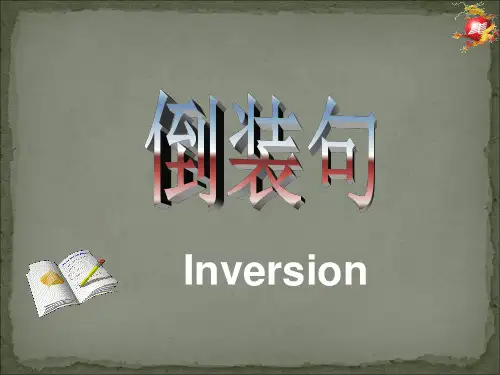
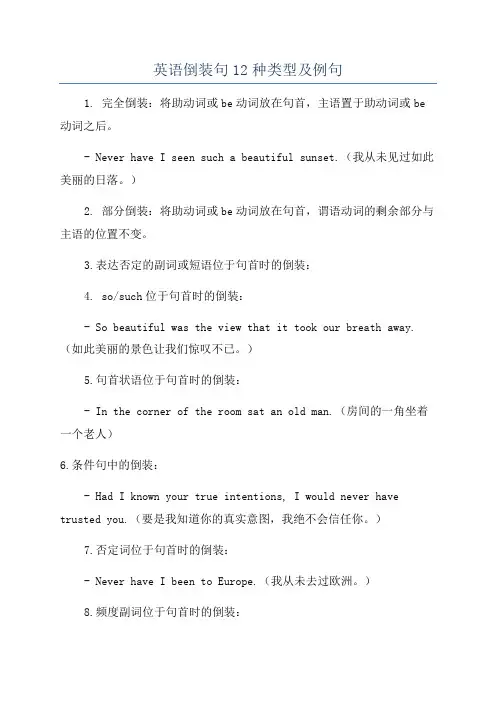
英语倒装句12种类型及例句1. 完全倒装:将助动词或be动词放在句首,主语置于助动词或be 动词之后。
- Never have I seen such a beautiful sunset.(我从未见过如此美丽的日落。
)2. 部分倒装:将助动词或be动词放在句首,谓语动词的剩余部分与主语的位置不变。
3.表达否定的副词或短语位于句首时的倒装:4. so/such位于句首时的倒装:- So beautiful was the view that it took our breath away.(如此美丽的景色让我们惊叹不已。
)5.句首状语位于句首时的倒装:- In the corner of the room sat an old man.(房间的一角坐着一个老人)6.条件句中的倒装:- Had I known your true intentions, I would never have trusted you.(要是我知道你的真实意图,我绝不会信任你。
)7.否定词位于句首时的倒装:- Never have I been to Europe.(我从未去过欧洲。
)8.频度副词位于句首时的倒装:- Rarely do we see such dedication.(我们很少见到如此的奉献精神。
)9.祈使句或祈使句部分的倒装:- Stand up!(站起来!)- Be quiet, please.(请安静。
)10. only位于句首时的倒装:- Only by working hard can you achieve your goals.(只有通过努力工作,你才能实现目标。
)11.地点状语置于句首时的倒装:- In the garden were beautiful flowers.(花园里有美丽的花朵。
)12.宾语置于句首时的倒装:- A love like this I have never felt before.(我之前从未感受过如此的爱。
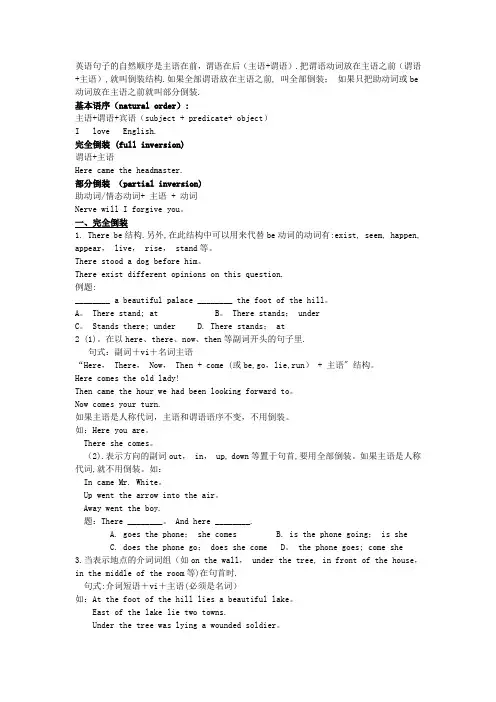
英语句子的自然顺序是主语在前,谓语在后(主语+谓语).把谓语动词放在主语之前(谓语+主语),就叫倒装结构.如果全部谓语放在主语之前, 叫全部倒装;如果只把助动词或be 动词放在主语之前就叫部分倒装.基本语序(natural order):主语+谓语+宾语(subject + predicate+ object)I love English.完全倒装 (full inversion)谓语+主语Here came the headmaster.部分倒装(partial inversion)助动词/情态动词+ 主语 + 动词Nerve will I forgive you。
一、完全倒装1. There be结构.另外,在此结构中可以用来代替be动词的动词有:exist, seem, happen, appear, live, rise, stand等。
There stood a dog before him。
There exist different opinions on this question.例题:________ a beautiful palace ________ the foot of the hill。
A。
There stand; at B。
There stands; underC。
Stands there; under D. There stands; at2 (1)。
在以here、there、now、then等副词开头的句子里.句式:副词+vi+名词主语“Here, There, Now, Then + come (或be,go,lie,run) + 主语" 结构。
Here comes the old lady!Then came the hour we had been looking forward to。
Now comes your turn.如果主语是人称代词,主语和谓语语序不变,不用倒装。

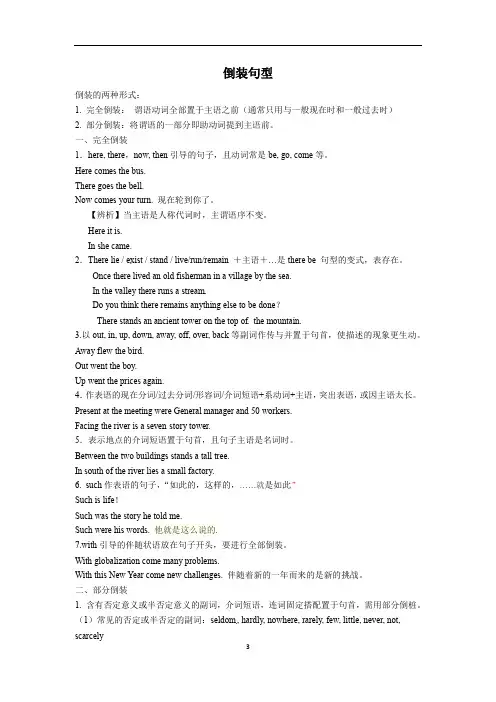
倒装句型倒装的两种形式:1. 完全倒装:谓语动词全部置于主语之前(通常只用与一般现在时和一般过去时)2. 部分倒装:将谓语的一部分即助动词提到主语前。
一、完全倒装1.here, there,now, then引导的句子,且动词常是be, go, come等。
Here comes the bus.There goes the bell.Now comes your turn. 现在轮到你了。
【辨析】当主语是人称代词时,主谓语序不变。
Here it is.In she came.2.There lie / exist / stand / live/run/remain +主语+…是there be 句型的变式,表存在。
Once there lived an old fisherman in a village by the sea.In the valley there runs a stream.Do you think there remains anything else to be done?There stands an ancient tower on the top of the mountain.3.以out, in, up, down, away, off, over, back等副词作传与并置于句首,使描述的现象更生动。
Away flew the bird.Out went the boy.Up went the prices again.4.作表语的现在分词/过去分词/形容词/介词短语+系动词+主语,突出表语,或因主语太长。
Present at the meeting were General manager and 50 workers.Facing the river is a seven-story tower.5.表示地点的介词短语置于句首,且句子主语是名词时。
Between the two buildings stands a tall tree.In south of the river lies a small factory.6.such作表语的句子,“如此的,这样的,……就是如此”Such is life!Such was the story he told me.Such were his words. 他就是这么说的.7.with引导的伴随状语放在句子开头,要进行全部倒装。
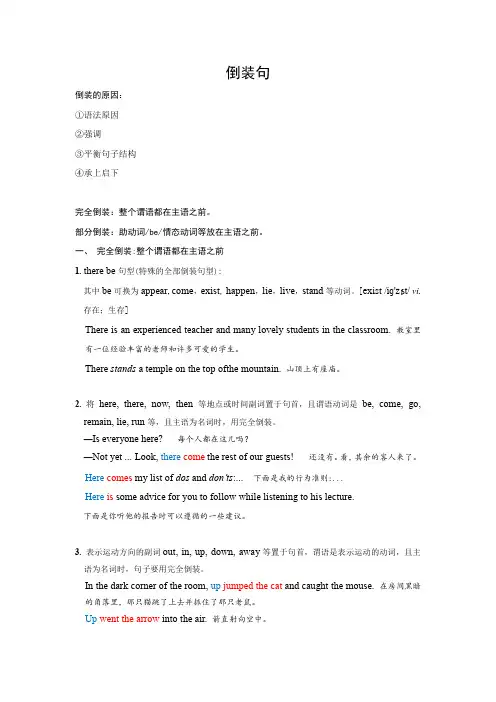
倒装句倒装的原因:①语法原因②强调③平衡句子结构④承上启下完全倒装:整个谓语都在主语之前。
部分倒装:助动词/be/情态动词等放在主语之前。
一、完全倒装:整个谓语都在主语之前1. there be句型(特殊的全部倒装句型):其中be可换为appear, come,exist, happen,lie,live,stand等动词。
[exist/iɡ'zɪst/ vi.存在;生存]There is an experienced teacher and many lovely students in the classroom. 教室里有一位经验丰富的老师和许多可爱的学生。
There stands a temple on the top ofthe mountain. 山顶上有座庙。
2. 将here, there, now, then等地点或时间副词置于句首,且谓语动词是be, come, go, remain, lie, run等,且主语为名词时,用完全倒装。
—Is everyone here? 每个人都在这儿吗?—Not yet ... Look, there come the rest of our guests! 还没有。
看,其余的客人来了。
Here comes my list of dos and don’ts:... 下面是我的行为准则:...Here is some advice for you to follow while listening to his lecture.下面是你听他的报告时可以遵循的一些建议。
3. 表示运动方向的副词out, in, up, down, away等置于句首,谓语是表示运动的动词,且主语为名词时,句子要用完全倒装。
In the dark corner of the room, up jumped the cat and caught the mouse. 在房间黑暗的角落里,那只猫跳了上去并抓住了那只老鼠。
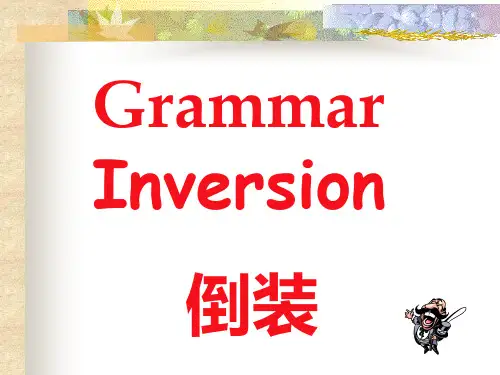
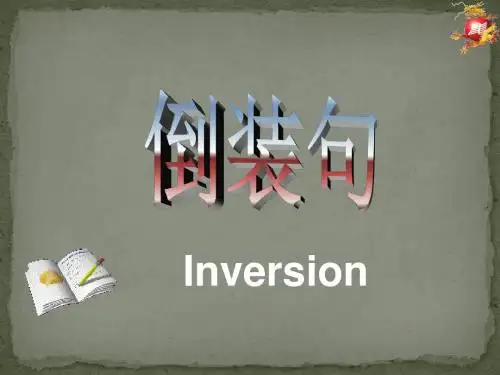
高中英语倒装02-全部倒装倒装句主要分为和。
第十三章倒装A. 完全倒装完全倒装是将谓语的全部放在主语之前,此结构通常只用于一般现在时和一般过去时两种。
On her left sat her husband. 她左边坐着她丈夫。
Here is the book you want. 你要的书在这儿。
Down went the small boat. 小船沉下去了。
A.常见的完全倒装结构1.there be 句型。
There is a mobile phone and some books on the desk. 桌上有一个手机和一些书。
There are thousands of people gathering on the square. 广场上聚集着成千上万的人注意引导词there 还可以接appear, exist, lie, remain, seem, stand, live 等词。
There lived an old fisherman in the village. 村里住着一位老渔夫。
There stand two white houses by the river. 河滨矗立着两座白房子。
There existed some doubt among the students. 学生中有些怀疑。
2.用于here, there, now, thus, then + 动词+ 主语的句型中(谓语动词多为be, go, come 等)。
Here comes the bus.汽车来了。
There goes the bell. 铃响了。
Now comes my turn. 轮到我了。
Then came the order to take off. 起飞的命令到了。
3.以out, in, up, down, off, away 等副词开头,谓语动词是表示“移动”的go, come, leave 等句子里。
倒装句(完全倒装、部分倒装)一.完全倒装1.Here,There, Now, Then等置句首时,用完全倒装。
谓语动词常用come,go,be, run, lie等。
There comes the bus! Now comes your turn.2.表示方位的副词或介词短语置句首时用完全倒装,句子位于常是come, go 等表示运动的词。
1) The door opened and in came the headmaster.2) By his side stood a little boy.3) Near the factory was a hospital.注意上述完全倒装句子中,当主语是人称代词,应该放谓语动词之前。
①Here comes Miss I ee. Here she comes.②Away went the students. Away they went.3.当句子没有宾语而主语较长/为使上下文衔接紧密常用完全倒装,即把状语/表语置于句首。
1) Gone are days when they could do what the imperialists like to. the Chinese people.2) At the foot of the hill lies a beautiful lake and near the lake are some farm houses in trees.部分倒装1.以下否定词放句首时用部分倒装: no, never, hardly, barely, scarcely, little(也不),never before(以前不久),not,, until,,no sooner, than,,hardly,, when,,by no means决不),in no case决不),in no time立刻,很快), nowhere, not only but (also),等。
倒装句倒装的两种考法:1. 放在单项选择题中,考查考生的倒装语法知识是否熟练掌握;2. 放在完形填空和阅读理解中,设置理解障碍.倒装的两种形式:1. 完全倒装:将整个谓语动词提到主语前.2. 部分倒装:即半倒装,将谓语的一部分即助动词提到主语前.一、完全倒装1表方位的副词here, there 或out, in, up, down, away, off, over, back等标志词放在句首,句子用完全倒装.翻译句子1车来了. Here comes the bus.2铃响了. There goes the bell.3孩子们冲出来了. Out rushed the children.4那个男孩离开了. Away went the boy.疑难Here it is.In she came.Away he went.疑难剖析当主语是人称代词时,主谓语序不变.2地点状语放在句首且谓语动词为come, live, lie, go, sit, stand等时用完全倒装.完成例句5河的南面有一家小工厂.In south of the river lies a small factory. 6山谷里传来一声喊叫.From the valley came a cry.3 such, the following等放句首时,句子要完全倒装.翻译句子7Such are the facts. 情况就是如此.8生活就是这样. Such is life.9The following is the answer to the question. 这个问题的答案如下.4There lie / exist / stand / live +主语+…是there be 句型的变式翻译句子10山顶上有一幢高楼.There is a tall building on the top of the mountain.11山顶上耸立着一座古塔.There stands an ancient tower on the top of the mountain.5“表语+系动词+主语”的结构.例句观察Present at the party were Mr. Green and many other guests.出席晚会的有格林先生,还有一些别的宾客.Seated on the ground are a group of young men. 坐在地上的是一群年轻人.注意此时,主语较长,可还原为正常语序即:主+系动词+表语.二、部分倒装将情态动词、助动词、be提到主语前. 通常可以还原为正常的语序,并以此检验倒装句是否正确.1含有否定意义的副词或短语如:few, little, never, not, nowhere, rarely, seldom, at no time, by no means, in no case等放在句首时,需用部分倒装.翻译句子12Little does he know about the news. 他对这消息知之甚少.13By no means can he catch up in such a short time. 他根本不可能在这么短的时间里赶上来.疑难1He is active in personality, and he seldom stays indoors. 无助动词He is active in personality, and seldom does he stay indoors. 添加does疑难剖析1若原句中没有助动词,必须根据谓语动词的具体时态来确定相应的助动词do, does 或did.完成例句14—我有大量的工作要做.— I've got an enormous amount of work to do.—我也是.—So have I.15他,和他全家人一样,相信你是无辜的.He believed, as did all his family, that you were innocent. 16如果她不同意这个计划,Tom也不会同意.If she doesn‘t agree to the plan, neither will Tom.2so / as / neither / nor 为标志词放在句首时,句子用倒装.①表示前面所说的肯定情况,也适合于另一人或物时,句式如下:so / as + be 助动词或情态动词+主语.②表示前面所说的否定情况也适合于另一人或物时,句式如下:neither nor+ be 助动词或情态动词+主语.特别提醒①“so +主语+助动词或be动词”表示对上文肯定的内容加以肯定或赞同,意为“的确如此”;— It's raining hard. 天下着大雨.— So it is. 是的.②“主语+did +so”表示:“主语”这样做了. 例如:Tom asked me to go to play football with him and I did so. Tom要我去踢足球,我去了.3①“only +状语或状语从句”放在句首时,句子用部分倒装.②only之后跟的不是状语时不可倒装.完成例句17你只有用这种方法才能学好英语.Only in this way can you learn English well.18只有他有时间的话他才会来.Only if he has time will he come here. 19他被请了3次才来开会.Only after being asked three times did he come to the meeting.20Only that boy can work out the problem. 只有那个男孩才能解答出这个问题.21Only socialism can save China. 只有社会主义才能救中国.4在if引导的虚拟语气条件句中,从句谓语有助动词were, had, should 时,可将if 省略,而把 were, had, should 移到句首.翻译句子22如果我是你,我就不会那样做. Were I you, I wouldn't do that.特别提醒①若从句是否定句,则必须将 not放在主语后.② had必须是助动词.5在“so…that” 和“ such…that”结构中,将“so+adj. ”和“such+n. ”提到句首时,句子用部分倒装.完成例句23暴风雨如此厉害,整个屋顶都被吹掉了.So terrible was the storm that the whole roof was blown off. 24杰克是如此聪明的孩子,他能解答所有这些难题.Such a clever boy was Jack that he was able to work out allthese difficult problems.6often, always, once, many a time, now and then, every the other day, then等状语位于句首时,句子部分倒装.完成例句以前我经常提到他.Often did I speak of him.他常常帮助我做实验.Many a time has he helped me with my experiment.7在not…until…, no sooner…than…, scarcely/hardly…when,not only…but also…, neither…nor…,等否定词开头的句式中.完成例句约翰知道昨天才改变了主意Not until yesterday did John change his mind.她一坐下,电话就响了.Hardly had she sat down when the phone rang.他没去拜访她,他也不会这样做.Neither has he called on her,nor will he do so.她不但说的正确,而且说的流利.Not only did she speak correctly, but also she spoke fluently.8当as /though引导让步状语从句时,可出现“N/adj/adv/分词+as +S+V”或“V+as+S+助动词”的倒装形式.当表语是名词时,名词前不加任何冠词.完成例句尽管他们很勇敢,但这样的危险仍使他们感到畏惧.Brave as they were, the danger made them afraid.尽管他是孩子,但是他知道的很多.Child as he is, he knows a lot of things.虽然尝试了,但是她打不开门.Try as she might, she couldn’t get the door open.8当may 放句首,表达祝愿时,句子倒装.May you succeed.。
高中英语倒装02-全部倒装倒装句主要分为和。
第十三章倒装A. 完全倒装完全倒装是将谓语的全部放在主语之前,此结构通常只用于一般现在时和一般过去时两种。
On her left sat her husband. 她左边坐着她丈夫。
Here is the book you want. 你要的书在这儿。
Down went the small boat. 小船沉下去了。
A.常见的完全倒装结构1.there be 句型。
There is a mobile phone and some books on the desk. 桌上有一个手机和一些书。
There are thousands of people gathering on the square. 广场上聚集着成千上万的人注意引导词there 还可以接appear, exist, lie, remain, seem, stand, live 等词。
There lived an old fisherman in the village. 村里住着一位老渔夫。
There stand two white houses by the river. 河滨矗立着两座白房子。
There existed some doubt among the students. 学生中有些怀疑。
2.用于here, there, now, thus, then + 动词+ 主语的句型中(谓语动词多为be, go, come等)。
Here comes the bus.汽车来了。
There goes the bell. 铃响了。
Now comes my turn. 轮到我了。
Then came the order to take off. 起飞的命令到了。
3.以out, in, up, down, off, away等副词开头,谓语动词是表示“移动”的go, come, leave等句子里。
There be句型1、明天我们学校有一场英语演讲比赛。
2、自由女神像the Statue of Liberty矗立在纽约港口。
3、有条河在这座城市里流过。
表地点的介词短语位于句首1、我校是一所省重点高中,位于海丰县城北。
校园很美,绿树成荫。
2、山顶上有一座古寺,已经有1000多年的历史了。
3、墙上有个通知,上面写着“请节约用水”.强调表语1、上周五高二年级进行了一场英语演讲比赛。
出席的人有高二级全体学生、高二全体英语老师及校领导。
半倒装so/such ~~~that ~~~句型1、时间是如此珍贵,我们不能浪费它。
2、他如此沉溺于网络游戏以致于他的成绩下降得很厉害。
3、我们有如此多的作业要做以至于我们没有时间放松。
4、这个问题如此的严重,以至于我们不得不找到有效的解决办法。
1、我们绝对不能忽略知识的价值,以及实际的经验。
2、不论什么原因游客都不允许用东西喂动物。
3、青年人决不应疏忽每天的体育锻炼。
4、环境对于我们来说就好像鱼儿离不开水-我们绝对没法脱离它而生存。
5、依我看,我们绝不能把财富和幸福等同起来.我还认为人们永远也不应该只依靠财富去实现幸福。
Only+状语1、只有我们每个人都意识到水的重要性, 我们才能生活得更好.2、只有用这种方式, 我们才能有足够的精力好好学习.3、只能通过联合努力我们才能快速发展。
not only~~~but also~~~1、广告不仅让我们了解最新的产品而且还很有娱乐性。
2、学习做饭不仅使孩子们更加独立,而且还可以让他们远离垃圾食品。
as/though引导让步状从1、虽然我们的国家富有,我们的生活品质绝对令人不满意。
2、尽管钱很重要,但它买不来幸福。
3、尽管Lily是个新老师,她很受学生欢迎。
4、尽管他已经非常努力了,可他最后还是没有通过考试。
There be句型1、明天我们学校有一场英语演讲比赛。
2、自由女神像the Statue of Liberty矗立在纽约港口。
高中英语语法:特殊句式之倒装句一、全部倒装全部倒装就是把句子的谓语动词前置到主语前面构成的倒装句。
★1、表示方向、地点、位置移动或时间的副词,比如in、out、down、off、away、now、then、here、there等置于句首且主语是名词时,句子用全部倒装。
◇Here comes the bus. 公交车来了【但当主语是人称代词时,句子不倒装。
比如Here she comes.她来了】◇Now comes your turn. 现在轮到你了。
◇Up went the fireworks into the air.嗖的一声,焰火上了天。
★2、表示存在的there be句型,主语在be之后。
除了be外,还可使用lie,live,come,exist,sit,stand,remain等不及物动词。
◇ There are so many things to learn today.今天有很多东西要学。
◇There exists an ancient temple in this town,which attracts many visitors.这个镇上有一个古代庙宇,吸引着许多游客。
3、介词短语放在句首作状语,谓语动词是lie, stand , sit ,exist , stretch , come等或系动词be,主语是名词时。
◇At the foot of the mountain lies a clean stream.山脚下有一条清澈的小溪。
4、代词such放在句首,句子的谓语动词是be。
◇Such is what he wanted.这就是他想要的。
5、为了保持句子平衡,使上下文紧密街接,常将表语和状语放在句首,引起主语和谓语的倒装。
◇Gone are the days when we used foreign oil.我们用“洋油”的时代一去不复返了6、现在分词、过去分词、形容词、副词等有时可移到句首,来对动作或状态加以强调。